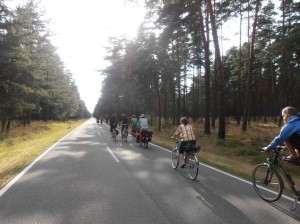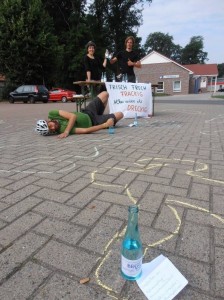A “die-in” energy protest
It’s the third week of the Reclaim Power Tour, a political bicycle tour, crossing Germany from East to West, covering about a thousand kilometers. Dorothee Häußermann, who’s part of the tour, blogs about meeting different energy activists and an anti-fracking campaign that ends with an unusual protest.
During the tour, we’re visiting different hot spots of a grassroots energy transition: climate camps against open-cast coal-mines, members of the anti-nuclear movement, co-operatives who build their own wind turbines and so on. The aim of the tour is to connect these active local groups in a large network, so we can build a strong movement for a eco-friendly and democratic energy supply that can curb climate change.
We’re curently crossing the state of Lower Saxony. It’s a farming region dotted with small villages and endless corn fields. The area is the focus of various energy companies because of the presence of shale gas reserves in the ground. The companies are currently carrying out test drills to find out if they can exploit the shale gas with a method called ‘hydraulic fracturing’, also known as ‘fracking’. This is a technique in which a mixture of water, sand and chemicals is injected at high pressure into a wellbore to create small fractures in the rock. The sand keeps these fractures open so the gas can be extracted. In recent years, the technique has been at the centre of a highly controversial debate in Germany. There is evidence that the chemicals used in the fracking process could contaminate rivers and drinking water reservoirs.
After 70 kilometres of cycling, we are scheduled to meet a local initiative that is determined to drive away ExxoMobile, a corporation that has been doing test drills in the area. A group of 15 people is awaiting us on the local sports ground where we can put up our tents. They’ve made delicious lentil soup and vegan salads for us, and put sausages on the grill for themselves. The day has been long and hot, and I would love to have a shower, grab one of the beers they are kindly offering, and then collapse in my sleeping bag. But we have some work to do: we are planning a street protest the following day in town that needs preparation. And of course we have to get to know each other, and hear about the people’s fears – about the test drills right in front or below their houses – and about how they have managed to mobilize a large part of the town to take a stance against fracking. And after (temporarily) overcoming my exhaustion, I’m enjoying it. After all, that’s why we are on the road. To get to know local groups, to learn from their expertise, but also, to contribute a new perspective to the discussion: To see fracking as part of an energy system that exploits the last fossil fuels on the planet, in order to keep up an economy that puts growth and profit before the welfare of nature and people. We saw many other sides to the energy debate earlier on the route.
The next morning, we meet at the market square for our”die-in” protest. We offer mock passers-by samples of water with suspicious names, resembling chemicals used in hydraulic fracturing, praising their quality. The bottles are adorned with labels such as “Eau de Frack – con gas – probably not poisonous” or “BioCide – makes you fractive for the day”. Unfortunately, some of the pedestrians collapse after drinking and die on the spot. Opposite our little street performance, the local initiative talks to people and collects signatures for a petition.
After a couple of hours on the market, we pack our bikes and move on. Our next destination awaits us – it’s the next stage of our struggle for a democratic and green energy system.





